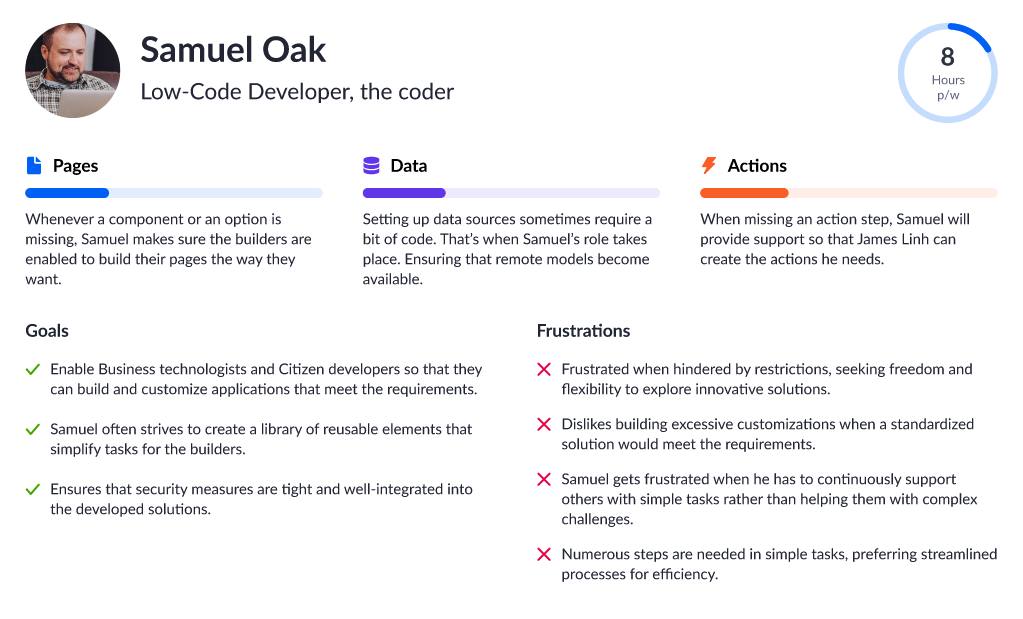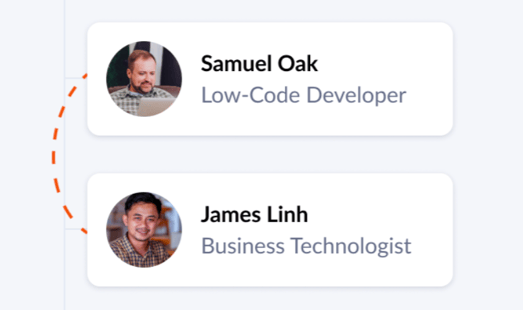What is a low-code developer?
This article explains the role of a low-code developer in Betty Blocks application development process
At Betty Blocks, a low-code developer is a key proficient player responsible for providing custom coding solutions, enabling businesses to adjust applications precisely to their unique needs. This article explores the low-code developers’ role within Betty Blocks, their specialized expertise, and their responsibilities in driving innovation and customization in application development.
While the Betty Blocks platform is designed for business technologists to build applications and citizen developers to govern them, low-code developers bring advanced technical expertise to the table. Their role extends beyond basic application building; they are advanced experts who customize, extend, and support other builders within the platform, ensuring that applications meet complex and personalized business requirements.
Low-coder’s expertise and focus
Samuel is a skilled low-code developer working with Betty Blocks. He specializes in creating and supporting custom solutions beyond the platform's native capabilities. Samuel’s primary focus is to enable business technologists and citizen developers to achieve their goals by filling the gaps that arise when standard functionalities are insufficient.

A low-code developer's main areas of focus include:
-
Pages customization:
-
Custom page components: Low-code developers have the expertise to create custom components using React and Git, managing dependencies, interactions, and custom wrappers.
-
Debug/network tools: They utilize advanced debugging and network tools to troubleshoot and optimize applications during development.
-
-
Model customization:
-
Custom data sources (remote models): Low-code developers are skilled in integrating external data sources, allowing for the extension of data models beyond the default options provided by Betty Blocks. This requires an understanding of remote models and how to connect them with the platform.
-
JSON schema models: They are proficient in working with JSON schema models, which allows for more complex and customized data handling within applications.
-
-
Actions customization:
-
Custom action steps: Developers can create custom action steps, using their knowledge of JavaScript (ES) and Command line tools (Terminal or Command Prompt), to extend the functionality of applications.
-
-
Integrations:
-
Data API: They manage and create APIs to allow for seamless data flow between different systems.
-
HTTP requests: Handling HTTP requests is part of their responsibilities, enabling applications to communicate with external services.
-
-
Block Store customization:
-
Action block management: They manage and customize action blocks within the Betty Blocks platform, ensuring that reusable components are tailored to meet specific business needs.
-
Collaboration with other roles
In the collaborative ecosystem of Betty Blocks, Samuel, the low-code developer, plays a key role in supporting James, the business technologist, particularly when challenges arise within the platform.
James is adept at using the platform's native tools but occasionally encounters situations where critical components, action steps, or connections to data sources are missing. In these instances, Samuel steps in to provide the necessary support by creating custom components, developing the required action steps, and establishing connections to remote data models.
A low-code developer’s approach is deeply rooted in the principle of maximizing reusability. By crafting solutions that can be leveraged across multiple projects, he ensures that business technologists and other users can easily access these components through Block Store

A citizen developer Jessie only collaborates with Samuel on quite specific tasks, typically when Jessie's objectives extend beyond the platform's capabilities. Jessie turns to Samuel when she needs a new page template with a comprehensive configuration flow. In case an issue arises with an external source that James can't resolve (such as data sources/APls). In those cases, Samuel is the go-to person. In simple terms, Jessie relies on Samuel for coding-related matters, while James is her point of contact for tasks within the platform.
Technical skillset
A low-coder’s journey involves pro-code aspects of development, where they use languages like React and TypeScript to create new customizations or enhance existing ones. These developers should also possess a deep understanding of object-oriented programming (OOP), which they use to unlock the full potential of the platform.
-
React and TypeScript: These languages are the basis for building custom front-end components and action steps that integrate with Betty Blocks, offering unparalleled customization and flexibility.
-
Integration mastery: Besides frontend development, low-code developers must be adept at integrating various services and APIs. This involves writing custom code to bridge gaps between the platform and external systems.
A low-code developer is not just a builder; they are an integrator, a troubleshooter, and a key player in ensuring that applications are fully optimized, highly customized, and seamlessly integrated with other systems. This role requires a deep understanding of the platform’s potential, alongside the ability to code and manage complex interactions within the Betty Blocks environment.
